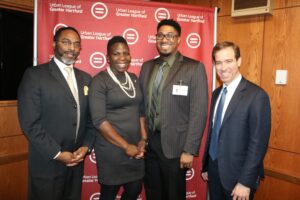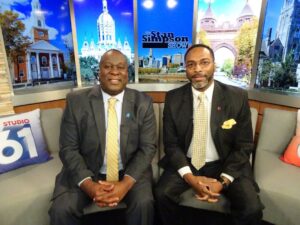
The Urban League of Greater Hartford is a community-based, nonprofit 501(c)(3) with a mission to reduce economic disparities in our regional by providing programs, services, and educational opportunities. President and CEO David Hopkins spoke with MetroHartford Alliance (MHA) Content Manager Nan Price about how the organization makes an impact in the Hartford Region and how its mission aligns with the MHA’s newly formed Racial Equity and Economic Development Leadership Committee.
NAN PRICE: What message do you want to share about the Urban League of Greater Hartford?
DAVID HOPKINS: The most important message we want to share is that we are an economic empowerment agency. What that means is we identify specific pillars as paths to empowerment: education, employment, housing, financial literacy, health and wellness, and of course advocacy.
We also want people to understand that, although we do target low and moderate income communities and the underserved, the Urban League uniquely distinguishes itself as explicitly but not exclusively serving the Black community. We try to distinguish this because we acknowledge there are structural and systemic barriers that have historically excluded Black Americans from participating equitably in our economy. Even people at executive levels of management and professionals who can afford expensive homes can find themselves facing challenges in terms of personal finances, retention and promotion, health services and awareness, or the types of loans they receive.
All those things are often rooted in historically racial context. So, when we talk about empowerment, we talk about ways to address those disparities and create options for people.
NAN: Can you provide some examples for how you accomplish your mission?
DAVID: We address some economic disparities with our educational programming, including Project Ready, one of our cornerstone programs, which is focused on getting youth ages 14 to 18 ready for college, work, or life.
Project S.T.A.B.L.E., a signature program, is an integrated team effort across our Economic Enrichment and Workforce Development departments. It focuses on career advancement, helping with the job application process, resume writing, and interview preparation and then job placement to help ensure participants get to a place where they can be skilled and upskilled to retain within a company.
Financial literacy is another key component of Project S.T.A.B.L.E. We want to enable families to move into a higher quality of life because we understand personal finances can handcuff participants, limiting their purchasing and asset building options. The financial empowerment arm of Project S.T.A.B.L.E. also includes helping people get into home buyer programs so they can purchase their first homes.
We provide these programs to address this issue of disparities because, while we may not be on the decision-making side to provide jobs and promotions, we do believe if we can provide participants with the necessary skills, then they can be more self-reliant and have more control over their options.
NAN: You’re a member of the MHA’s Racial Equity and Economic Development Leadership Committee. From your perspective, how can the committee help drive change in our region?


DAVID: A little background. When I first joined the Urban League of Greater Hartford in 2019, I looked at all the ways the organization could affect change and create opportunity. I was still learning about the organization, my role, the region, and the market space.
I quickly recognized parallels with the MHA. Both organizations focus on strengthening our economy. Where the MHA showcases the Hartford Region as a place corporations can successfully launch their East Coast operations, I thought about the stamp of approval or a level of credibility an organization like the Urban League could bring to that story. We can help convey that if your organization comes to the Hartford Region, not only would you have the benefit of all the things we already know to be valuable in this region, but you’re coming to a region with more than 70% percent racial diversity.
That means there are people in our region who could immediately add to your corporate social responsibility agenda. They can help build out some mass production-type plant or get into professional or management jobs that can serve your operation. The value add to the pitch to corporations is their operational needs can be met by locating here and they can help change the economic trajectory of a significant part of the population. So, I really wanted to see if the Urban League could help with the MHA’s mission in that respect.
MHA President and CEO David Griggs and I have had many conversations about topics related to economic development in our region. Early into the COVID-19 pandemic, we started talking about some of the larger employers in the region and how they could engage small businesses beyond maintenance and cleaning services.
Our conversations began evolving. Once we were talking about how there’s a lack of racial diversity on so many boards of directors. I questioned whether the MHA could lean on some of our existing corporations—or even those looking to target Hartford as a region—and encourage them to think about not just hiring for low-level warehousing-type jobs. How can we encourage them to think about diversity in terms of hiring people at the senior manager to executive level and placing people of color on their boards of directors? It’s a more comprehensive and holistic approach to thinking about how to use diversity to impact an organization and to impact the region.
This is where I admire David Griggs so much. Recognizing it was a bigger issue with bigger opportunities, he said: Let’s bring some minds together to talk more about this.
Ultimately, this is where I see my role and the role of the Urban League working in partnership with other voices around the table to help figure out how the MHA Racial Equity and Economic Development Leadership Committee will be a valuable tool that can boldly create awareness and provide information.
For example, after the George Floyd incident that sparked so many different reactions, the Urban League received many phone calls, many from corporations wanting to do more through financial contributions, namely to the Black Lives Matter Movement, but also from those wanting volunteer opportunities ranging from mentoring to wondering when we were going to paint a Black Lives Matter sign or something like that.
It provided an opportunity for me to emphasize that that’s not where this economic and social justice thing lies. It’s not just about painting a sign or coming together for a vigil, or even mentoring. It requires more sustainable, empowering action. So, I would ask: Is your company doing differently, more, or better to hire, promote, retain, or equitably pay people of color? I think that’s where the MHA Racial Equity and Economic Development Leadership Committee can help make a difference.
Learn more about the Urban League of Greater Hartford
www.ulgh.org | Facebook | Instagram | LinkedIn
